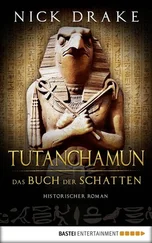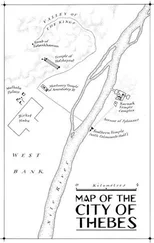Nick Drake - Nefertiti
Здесь есть возможность читать онлайн «Nick Drake - Nefertiti» весь текст электронной книги совершенно бесплатно (целиком полную версию без сокращений). В некоторых случаях можно слушать аудио, скачать через торрент в формате fb2 и присутствует краткое содержание. Жанр: Исторический детектив, на английском языке. Описание произведения, (предисловие) а так же отзывы посетителей доступны на портале библиотеки ЛибКат.
- Название:Nefertiti
- Автор:
- Жанр:
- Год:неизвестен
- ISBN:нет данных
- Рейтинг книги:5 / 5. Голосов: 1
-
Избранное:Добавить в избранное
- Отзывы:
-
Ваша оценка:
- 100
- 1
- 2
- 3
- 4
- 5
Nefertiti: краткое содержание, описание и аннотация
Предлагаем к чтению аннотацию, описание, краткое содержание или предисловие (зависит от того, что написал сам автор книги «Nefertiti»). Если вы не нашли необходимую информацию о книге — напишите в комментариях, мы постараемся отыскать её.
Nefertiti — читать онлайн бесплатно полную книгу (весь текст) целиком
Ниже представлен текст книги, разбитый по страницам. Система сохранения места последней прочитанной страницы, позволяет с удобством читать онлайн бесплатно книгу «Nefertiti», без необходимости каждый раз заново искать на чём Вы остановились. Поставьте закладку, и сможете в любой момент перейти на страницу, на которой закончили чтение.
Интервал:
Закладка:
He didn’t sound convinced.
12
The south suburb was residential. Here were substantial estates hidden behind high walls, houses with large floor areas surrounded by what seemed to be walled gardens, granaries, stables and workshops. There was space between the dwellings for privacy, although most of it was spilling over with building materials and sometimes rubbish. Over these walls one glimpsed interesting plants thriving by virtue of the wells and water channels: tamarisk, willows, miniature date palms, persea trees, fashionable pomegranate bushes with their red crowned fruits and impossibly messy honeycomb of sour pips. And flowers: sky-blue cornflowers, poppies, daisies. The buildings too spoke of great affluence: stone lintels, most inscribed with the names and titles of the owners; extensive timber pergolas with vines; large courtyards and grounds.
‘Mahu has a house in this part of the city,’ offered Khety. ‘Also the Vizier Ramose.’
‘It is where the members of the elite live?’
‘Yes.’
‘And is it always this quiet? It’s practically religious.’
‘Noise is disliked.’
The absence of human life was disconcerting, and the hush felt haunted, as if the place were a town of rich ghosts.
Khety knocked on the door of what seemed a house as substantial and silent as most of the others in the street. Eventually we heard footsteps, and an immaculate servant admitted us. Once inside, however, a hidden world of activity revealed itself. Across the courtyard, with its trees and benches surrounding a circular water-pool, came the faint chink-chink-chink of many chisels tapping away on stone. There were suggestions of activity in other rooms too: calls for help or of appreciation; someone whistling. The servant disappeared to announce us.
Eventually, a bulky figure appeared in the passageway and walked towards us. He was a big man in every direction, his round, curious face like a dish set with blue eyes and a thinning cloud of red-brown hair. He yawned as he showed us through the main house and into a secondary courtyard. Down the length of the south side was a row of little studios and workshops, all busy with figures at work, tapping, chipping and painting.
‘You keep quite a large staff, I see.’
‘It’s hard to find enough good craftsmen to fulfil the demand. I had to bring most of them down from Thebes, and their bloody families. The rest I was able to recruit locally or from the delta towns. Sometimes I feel like I’m single-handedly supporting the economy of a small country.’
In the north-east corner of the plot stood another building which turned out to be his workshop, containing a large open space with rooms and passages leading off it. Light entered directly from the clerestory windows below the raised roof. He bellowed at his students and apprentices to leave and they hurried out obediently. On large tables and stands several works were in progress, recognizable body parts-fingers, hands, cheeks, arms, torsos-appearing from the hewn stones criss-crossed with rough black marks. But I was truly amazed to see, ranged along a shelf that ran the full length of the walls, countless white/grey plaster casts of heads-young, middle-aged and old, various classes-so detailed, so truly lifelike: the bristles of the chin, the delicate eyelashes of a girl, the warts and spots of an old woman; the wrinkles of time, the lines of character-all perfectly reproduced. Each head had its eyes closed, as if dreaming together of another world, a far-world beyond time.
‘I see you take an interest in my heads.’
‘They are so lifelike, one wonders when they will open their eyes and begin to speak.’
He smiled. ‘They might have interesting things to say to us.’
We sat together on a gilded bench in the corner of the room. Drinks were brought to us. Thutmosis sipped slowly and carefully from his cup, and I sipped from mine. A rich, deep red. Khety replaced his on the tray. I savoured mine, even though it was still early in the day for wine.
‘From the Dakhla Oasis?’
Thutmosis turned the jar towards him and read the marks. ‘Very good. Do you mind if I sketch you while we talk? My hands are only happy when they are working.’
He began to draw, his eyes roving over my face, his brush apparently working quite independently, for he never checked the marks he was making. First I asked him about his relationship with the Queen.
‘Can I call it a relationship? She is my patron, and, sometimes, muse.’
‘What does that mean?’
‘She is my inspiration. I cannot put it better than that. I am the maker of her images, which is to say, with her consent I have the honour to embody her living spirit in the materials of stone and wood and plaster.’
‘I think I understand.’
‘Do you? It is a perpetual mystery to me.’
‘Perhaps you could explain, in layman’s terms, how it all works. The creative process.’
Thutmosis sighed, and continued to sketch. ‘The Queen believes it matters to work from life. In the past, makers have been limited to embodying the virtues and perfections of the dead. Why? All those works are simply respectful copies, only remotely connected to their inspiration in life. All those enormous statues, so epic, so political, and so very uninspiring-unless you consider awe the only emotional response of value in art. And no doubt they were fat and crass and silly as people, but lo, here they are, with the physiques of gods, all muscle and wealth and contempt! Let’s be honest, it’s limited. Don’t you think?’
He put aside his sketch and, shifting his position, began another. I was becoming an artist’s model. I was starting to feel uncomfortable under his scrutiny. Yet I was curious to see how he had portrayed me.
‘But you don’t work that way?’
‘No, I cannot. It turns the image-maker into nothing more than a social servant. The artist is completely anonymous. The work is formulaic, generic. Nefertiti is right: these are the dead forms of the past. You see, my ambition is not to describe a living form, but to create it. And I believe that in the unimaginable future, those who still worship at these images will know that this was him , this was her , and no other. At the very end of time, human beings, whoever they are, will still look upon Akhenaten and Nefertiti and know them for who they were. Now that’s eternal life.’
He looked at me expectantly, hoping I would join him in his enthusiasm. I sipped my wine.
‘May I ask how you proceed to create an image of the Queen? Where do you start?’
‘We would have private sittings over many hours, many weeks. She would sit here and I would work directly from life. A life study.’
‘And you would talk?’
‘Not always. I would not assume her wish to converse, and also I cannot chat when I am working. The concentration is intense. It sounds pretentious to say so, but one is barely in the world. Time passes swiftly. Suddenly the light will be fading, there will be more grey hairs on my head, the Queen will be smiling at me, and there under my hands-a likeness. An image. A form.’
Which was all a clever way of not answering my question.
‘And the Queen, how does she pass this time?’
‘She thinks, she dreams. I love that. To recreate her in the act of thinking, the mystery of the mind in motion…’
‘So you do not recall what you talked about? Or how she seemed at the last sitting?’
‘She was very quiet.’
‘Unusually so?’
He looked directly at me. ‘Yes, I would say so.’
‘And what were you working on?’
‘A superb bust. My finest work, I think.’
‘May I see it?’
He put down his sketching and considered my request carefully. ‘Do you have the proper permissions?’
Читать дальшеИнтервал:
Закладка:
Похожие книги на «Nefertiti»
Представляем Вашему вниманию похожие книги на «Nefertiti» списком для выбора. Мы отобрали схожую по названию и смыслу литературу в надежде предоставить читателям больше вариантов отыскать новые, интересные, ещё непрочитанные произведения.
Обсуждение, отзывы о книге «Nefertiti» и просто собственные мнения читателей. Оставьте ваши комментарии, напишите, что Вы думаете о произведении, его смысле или главных героях. Укажите что конкретно понравилось, а что нет, и почему Вы так считаете.










